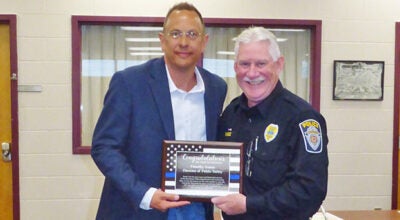Friend of the Court: A cross between social work and civil law
Published 2:26 pm Monday, April 4, 2011
“Everybody’s always mad at Friend of the Court. We’re caught in the middle 100 percent of the time because the mother has expectations, the father has expectations, sometime grandparents have expectations, but literally in cases, there may be five or six sides to every story, if they get a new spouse or a new significant other.”
Cass County Family Court Administrator and Friend of the Court Roland C. Fancher said his agency “is a cross between a social work agency and a civil law enforcement agency, but the main focus is to try and enforce the orders of the court” in the 43rd Judicial Circuit.
“There are so many more emotional issues involved in that than, say, most criminal proceedings,” he said Wednesday. “Friend of the Court was created in 1919 originally to collect welfare payments and evolved into custody and parenting time issues. Then the federal government got involved about 1975 and gave a lot of money to state and local government to enforce child support and to establish paternity because you have to establish who the father is before you can collect the child support. The whole child support system is like an onion, where you peel back one layer and there’s another layer underneath.”
Parents are having children out of wedlock at a higher rate — 40 percent statewide.
Court officials see family cases going up, but criminal numbers going down.
“I’m not saying there’s less crime,” Family Court Judge Susan Dobrich said, “just the number of cases are less. It could be budget cutbacks to law enforcement on the street statewide. Family’s growing in all areas and my numbers are up. In probate, I have guardianships for children, grandparents coming in because they need assistance resolving issues.”
Fancher said, “There are pressures that weren’t there when I was growing up, from the economy and video games to Internet access. I lived in Detroit and I wasn’t that aware of the drug situation. It was there, but not visible to us.
“Obviously, we can’t collect child support until there’s an order,” Fancher said. “They can come from prosecutors establishing paternity and what’s called family support where parents are generally separated. The other part would be divorce cases usually done through private attorneys.”
“Once a divorce is final and child support’s set, then Friend of the Court has the obligation of doing enforcement on all of these orders until the children attain the age of 18 and graduate from high school,” Dobrich.
Because of Cass being a border county, cases frequently cross state lines.
“We have a little over 4,600 active cases,” Fancher said. “The prosecutor and private attorneys have paternity and divorce cases which might go on for six months or a year. With children, they can go on 18 years. If there’s money owed when they turn 18, until we can collect it or write it off because of the statute of limitations.”
Dobrich remembers finding her name on cases which originated when she was prosecuting attorney in the mid-1980s.
Despite all the technological change applied to court proceedings, the Friend of the Court system operates much the same.
“Two-thirds, basically, is paid by federal dollars,” the judge said, “and a third by the county. There is more fairness statewide. What you receive in child support in Cass County is the same as what you would get in Van Buren or Berrien” — which wasn’t always the case.
“We have guidelines which standardized amounts. It used to vary from county to county and from judge to judge” in a metropolitan county such as Oakland. “There have been many improvements.”
Fancher said on the state level employers are required to report to a central authority in Lansing. “Income withholding is pretty much mandatory, and it wasn’t until 1988 or ’89,” he said. “The volume of paperwork crossing my desk as orders for approval increased 15 percent or better in 2010 compared to 2009.”
Dobrich, who has a pile of folders before her on a jury room table, said she signs “probably 50 orders a day. The paperwork and the machinery of the system is amazing.”
It can be frustrating for Fancher’s 12-member staff because they are so restricted by federal confidentiality laws that they can’t talk in anything but “generalities.”
“I got an e-mail from a new spouse today,” Fancher said, “and I’m going to have to write back to her and tell her I’m sorry I can’t discuss her husband’s case with her. We can’t respond to allegations. Some frustrations are not of our making,” especially at tax time.
“The federal government requires us to hold for six months to see if there’s going to be an innocent spouse claim,” Fancher said. “Most of the time we don’t even know the federal government’s held the money until people call up and say, ‘My ex said his income taxes were intercepted by the government and I haven’t gotten the money yet. Why is that?’ People think we’ve got a drawer somewhere where we’re sticking their federal income tax money and not giving it out until they call us and harass us to do so.”
Dobrich said “a hot legal issue going on” is “how do you define a dad? Biological? Legal? Equitable? If two people are married, the husband is presumed to be the father. If these people divorce at some point in time, maybe he should continue to be Dad because he’s raised these children. With DNA so accurate, we can figure out pretty easily who biological Dad is. It’s become a hot potato. Science and the law don’t always match, but there are some good reasons. We want children to come from married relationships. It’s better because there’s more permanency. I’m not saying children who come from non-married relationships can’t be good citizens because there are many of them who are.”
“When you get into it, there’s more to it than biology,” Fancher said. “If you’ve got a child who’s 16 and raised by someone he or she thinks is the father and the husband thinks he’s their father, they’ve got that close father-child relationship,” which is why there exists the concept of “equitable Dad,” who has been the legal father in a married relationship, then finds out later that someone else is the biological father.
“But he’s the one who supported the child, went to soccer games and did all the Dad stuff. We’re not going to let biology trump it,” Dobrich said. “There are a lot of people who would probably be shocked if they found out who their real parents were. We didn’t have technology to tell us. As I told someone in a court hearing a few weeks ago, ‘Biology doesn’t make him Dad. This man raised that child.’ It wasn’t until the Serafin case in the 1970s that allowed us to say a child didn’t come from a marriage and someone else could be made a legal father, which overruled an ancient case from Great Britain, Lord Mansfield, which said when two people are married and a child’s born, he’s Dad, period.
“In those days children were chattel. It had a lot of property aspects to it. It wasn’t until the last 110 years that children had any rights. We didn’t develop the child abuse protective system until 1900. It’s 100 years old. I remember when I first took the bench (in 1995), thinking, ‘I better find out what this Internet is.’ ”
Fancher tracks collections for monthly reports he distributes to his staff and the judges.
“Cass has been doing pretty well in relation to the rest of the state,” he said. “We’ve also been doing better, for the most part, than surrounding areas.” After slipping in December for the first time in six months, in January Cass County was once again the most improved of comparable counties with a 4.79-percent increase in collections over January 2010, followed by Ottawa County at 4.5 percent.
Fancher joined Cass County 4 1/2 years ago from five years in Kalamazoo County.
The attorney also worked in Alpena as a four-county Friend of the Court and as an attorney-referee in Oakland County for the late appellate judge Hilda Gage. He’s been “in the system” since 1979. He was also a deputy director for legal services in 36 counties of northern Michigan, “from Cadillac to Wisconsin.”
“We peaked on our collections in 2008,” before the Great Recession. “It hit collection really hard statewide,” Fancher said. “We were over $8 million and went down to $7.7 million. Last year we got back up to $7.9 million and we seem to be doing alright now. We’re waiting to see if Japan,” battered by earthquake and tsunami, “sells off its Treasury notes,” devaluing the dollar.






